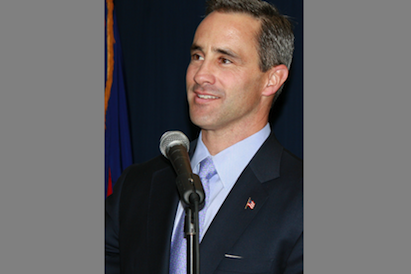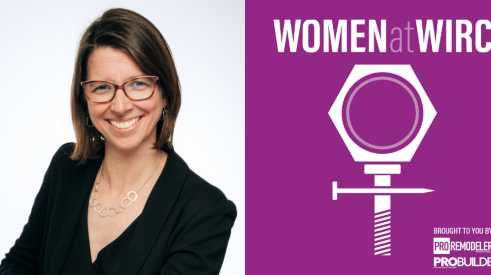Whether it’s health care, minimum wage, tax credits or lead paint rules, government is involved in business. This fall, the National Association of the Remodeling Industry hired a veteran Washington lobbyist, Tom Sullivan, to monitor issues that impact remodelers and to make sure that when laws or rules are being considered, the needs of remodelers are considered.
He’s perfectly suited for the job. In his former job as chief counsel for advocacy in the Small Business Administration, Sullivan was the highest-ranking government official tasked with advocating for small businesses before government agencies and Congress. In 2006, Inc. magazine named him “an entrepreneur’s best friend in Washington, D.C.” He’s also worked for the EPA.
Today, he works for the law firm of Nelson Mullins Riley & Scarborough LLP, and runs the Small Business Coalition for Regulatory Relief. “I’m a lobbyist. It’s true,” he says. “My mom still loves me.” We talked to him about the issues that he’ll be watching most closely in the months ahead.
PR: What are the most important issues NARI is watching in Congress this fall?
Sullivan: NARI is watching the debate on extending the Bush tax cuts very closely. Any tax hike would hit remodelers twice. Most remodelers are small businesses. As business people, if the tax rates expire Dec. 31, they’ll be paying more taxes. The other part, which is unique to service industries, is that their customers would have less money. They’ll be working on the homes of business people. If they are taking a hit from the taxman, it means they’re tightening their belts and putting off remodeling projects. That’s something to watch closely.
PR: Any good news on the tax front in the current congressional session?
Sullivan: There has been for some time the idea of a mini energy bill going through in the lame duck session [the period of time between elections in November and when the new Congress convenes]. If that’s the case, there’s likely going to be some energy-efficiency incentives. Many people in construction are looking at it very closely.
PR: The president just signed a bill for a $30 billion fund for small business lending. Is that really going to help small business owners? In talking to bankers, they say they have money to lend but no borrowers. Businesses aren’t asking for money.
Sullivan: The data I’ve seen is that the top priority of small business owners is that they need customer demand. The president believes if there’s credit available, there will be expansion opportunities. Small business owners say that’s one piece in a jigsaw puzzle. There’s so much regulatory uncertainty.
PR: Like the lead paint rules?
Sullivan: The LRRP [Lead Renovation, Repair and Painting] rule that the EPA has issued is a very serious concern for remodelers. We’re hoping we can make some difference there. Remodeling is a service industry – caring for customers is very obvious. Their care for customers extends to concern for the families in these houses. Remodelers are hearing from the EPA, “This is how you must protect your customers.” Tougher standards we can live with. What we can’t live with is a series of standards that doesn’t make sense and testing kits that give false positives…. EPA throws out this rule and says if everyone is trained by this course, everything will be better. Remodelers go to the courses and wind up with more questions than answers. If you dig deeply into what’s gone on with that rule and step back, you’ll see there are 15 other rules like this one. It’s easy to see how someone would say regulatory uncertainty is holding up economic recovery.
PR: What are your thoughts on the 1099 reporting requirement in the new health care law, and the chances of Congress repealing before it goes into effect in 2012?
Sullivan: Not only is it ridiculous, it was ridiculous when the last administration proposed it. It was dumb then and it’s dumb now. It won’t work. It reflects a naiveté about the type of reporting requirement that is crushing small business. You’re creating such a headache. What if you can’t find out the tax ID number, then you have to do withholding, then four months later find the supplier is legit. How do you get your money back? You don’t just hit a key on your keyboard and get it back.
The more Congress hears from small businesses about the paperwork, recordkeeping, accounting, and compliance nightmare caused by the 1099 requirement, the more likely it will be repealed. The bad news is that some of the options being proposed are more complicated than it is now. Unless it’s a full repeal, you could end up with a situation that’s worse. I’m wary of that happening, and it almost happened. There were Democratic alternatives to repealing the 1099 reporting requirement that almost did pass this summer.
PR: You wrote recently about President Obama’s appointment of Winslow Sargeant, who is not an attorney, as chief counsel for advocacy at the SBA. As someone who’s done that job, do you think it’s possible for someone without a legal background to effectively advocate the interests of small business?
Sullivan: I sure hope it’s possible for a non-attorney to do that job. I know from first-hand experience the importance of that position.
There are more unknowns than knowns. He just got there. His first comment letter to the EPA was extremely strong. He was brand new on the job and he went after the EPA the way he’s supposed to. If every involvement is that strong, I think he’ll do a great job. The road ahead for him is more difficult than it was for me. I had instant credibility with small business because I was with NFIB and I was an attorney. The only way he can get equal support from the business community is proving he can do the job. I didn’t have to do that. I have offered Dr. Sargeant any help I can give him. We’ve met for lunch, talked off and on over a year. I’m an optimistic person. I want to extend him well wishes. He does have an interesting and small business-related background. There are definitely tools there that will benefit him in his advocacy role. He has an exceptional legal team.
PR: You started your governmental career at the EPA, and the environment has been an area of ongoing interest for you. What do you see as being some key environmental regulatory issues for the remodeling industry?
Sullivan: The lead paint rule and all its iterations are my primary focus. It’s more than one rule. It’s a set of rules being planned by EPA. All the tentacles related to LRRP are front and center to remodelers. We also need to connect the dots between NARI and the people at EPA.
PR: In what way?
Sullivan: Right now, EPA thinks NARI is industry, period. Every person in the construction business is subject to regulations; they’re the enemy. Once EPA starts working with NARI and understands how highly trained they are, that remodeling is a service business and remodelers care for their customers the same way as EPA does, that’s when there’s a warming up and better policies start being written. It’s the mutual learning. There will be an education by me and the folks from NARI as well about what EPA is trying to do.
PR: We’re in the thick of an election season. What are some key races you’re watching and why?
Sullivan: I am not focused on individual races. Rather, I am looking at the potential of a Republican takeover in the House and possibly the Senate. I focus on what a change in party will mean to oversight. A Republican majority with a Democratic president will likely result in aggressive oversight of federal agencies by committee chairmen. Effective oversight can moderate regulatory proposals coming from EPA, OSHA and other federal regulators.
PR: What are you doing to get up to speed on the remodeling industry and the NARI membership?
Sullivan: I’m meeting them. I went to a great meeting recently in D.C. Oddly enough, I met most of my neighbors. It was cool for me to see the people whose signs I see everyday. One guy literally lives down the street from me. David Merrick is chair of NARI’s government relations committee – he’s introduced me to the NARI chapter here. At those meetings, I learn more than I ever learn on the Web or from books. I hear what their business is like and what their gripes are. It’s important to put faces with these hard-working business owners.
New NARI lobbyist Tom Sullivan talks about what he’ll be doing for the industry
Add new comment
Related Stories
How to Create a World-Class Remodeling Team
Great remodeling companies position themselves for the future with the right players
Everyone Should Have a Number: KPIs for Your Design Build Team
Measuring key performance indicators guides your team to success while creating accountability and ownership
How to Revamp Your Pre-Construction Process
Experiencing too much slippage and delays? See how Bridget Bacon of Red House Design Build solved these issues by improving the remodeler's pre-construction process
How This Remodeler Revamped Their Pre-Construction Process
Bridget Bacon of Red House Design Build outlines how she helped transform the pre-construction process for improved finances and morale
Building A Small Projects Division from the Ground Up
Through hard work and careful strategy, Harth Home Services has seen big growth
A Mindset of Serving Others
A research study shows surprising results about what makes us take ownership of our work.
3 Keys to Successful Team Management
On this episode of Women at WIRC, hear Laura Burnes delve into her approach to leadership and project management, in addition to sharing insights into Adams + Beasley Associates' winning culture.
4 Steps to Prep Your Business for Contraction
How a remodeling company plans ahead for the worst of times (and the best of times)
Helping Remodelers 'Get Their House In Order'
From remodeler to NARI executive to industry consultant, Diane Welhouse uses her expertise to help business owners













